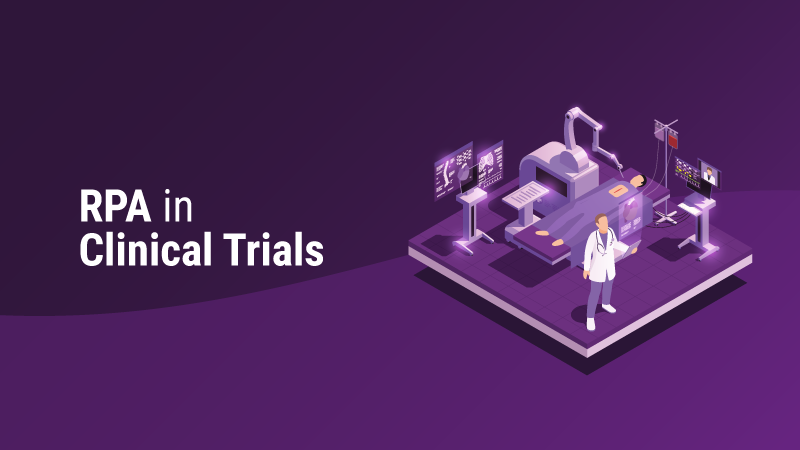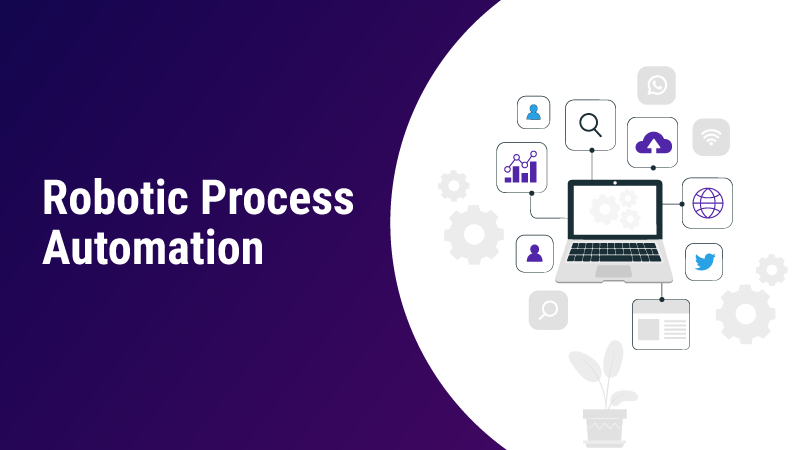Robotic Process Automation in Clinical Trials

Clinical trials are research studies aimed at determining whether any medical practice, device, or procedure can be used or consumed safely by humans. The clinical trial area involves a large volume of data and is highly driven by compliance. The data from the experiments establish the key control base needed to deliver the best health outcomes for patients by introducing advanced or modern treatments to the market while reducing the risks caused.
Besides the compliance requirements, clinical trials need extensive data management work. Most of the tasks that handle this data are quite obvious – and will distract researchers from their research. RPA in clinical trials offers a solution to that problem by relieving researchers from tedious and time-consuming tasks, thus helping them to focus on compliance, publication, and innovations in medical science. Here’s how to reduce costs, speed up research, and reduce errors in clinical trials using RPA.
RPA application in clinical trials
The complexity involved in a large number of clinical trials has the backing of many processes operating in the background. They need regular reporting, rigorous data administration, and stringent data quality maintenance. One of the great advantages of using robotic process automation in clinical trials is that it enables continuous recording of steps included in each process. Let us take a look into various applications of RPA in clinical trials:
Trial master process management
Every activity involved in a clinical trial is normally recorded by the sponsors. It consists of various sites in the main data storehouse known as the Trial Master File (TMF), where documents and data are entered manually.
By using RPA in clinical trials, it automatically uploads data and documents to TMF without human intervention, thus automating a repetitive and tedious task. This will reduce the time consumed for data entry by 90% and save millions of dollars a year on a clinical trial.
Patient matching
Setting up a patient population with dynamic inclusion and exclusion to evaluate the outcome of the trial is a tiring task. This is where the RPA tool plays its role. With an increasing number of trials conducted with patients enrolling using the internet, the amount of data to verify grows and requires more automated solutions, especially when combined with the growing interest in DTP (direct-to-patient) drug distribution strategies in trials. DTP distribution also eliminates patients’ need to physically visit the clinical site. As it potentially contributes to improved patient recruitment and retention, a high level of automation is required within the supply chain of a trial drug, to minimize risks and drive better results.
Regulatory submission process
When it comes to regulatory activities in clinical trials, the submission process takes a lot of time. For this, pharma companies have to engage in activities like monitoring document status and records compilation. With RPA, these tasks can be automated easily which will significantly reduce the time to hit the market.
Ease in administration
RPA bots are the perfect choice when it comes to increasing the efficiency of important administrative tasks in clinical trials. This will gradually enable pharma companies to give more attention to making safer and more effective drugs available in the market at lower prices. Rule-based workflows and processes in clinical trials can be improved by Robotic Process Automation. RPA bots are also capable of improving storage, transaction processes, etc.
Benefits of using RPA in clinical trials
There are so many processes involved in clinical trials and RPA tools help in simplifying each process and making them more efficient. This in turn results in accelerating the process and improving the precision of the results obtained. Regulatory authorities, including the Food and Drug Administration (FDA), have identified the advantages of automation and the use of modern and sophisticated technologies in organizations. This has resulted in more companies adopting RPA tools and techniques with the support and appropriate industry guidelines from the regulatory authorities.
Here are some of the benefits of using RPA in clinical trials:
Error reduction
Manual tasks are mostly prone to errors and automation highly reduces the possibility of clerical errors.
Cost reduction
Since less manual work is involved, the time to be spent on them is less. This not only reduces costs but also enhances the efficiency of the entire process.
Quick completion
Automation of the processes has resulted in optimizing every step of the trial and the overall completion of the study much faster.
Data quality improvement
With RPA, data quality becomes high with fewer errors and more accuracy. Better quality is the result of better data which in turn increases the possibilities for approval.
Pharmaceutical companies that begin with building an optimal strategy are the real ones to reap benefits from the use of robotic process automation. It must not only pay attention to finding the most promising tasks but also make sure that the purpose and potential advantages of automation are familiar to the employees involved in the processes.
Wrap Up
Healthcare organizations are required to collect a huge amount of information daily. This comprises data from a variety of sources, including clinical applications, scheduled applications, info from lab systems, radiology information, insurance portals, and ERPs (enterprise resource planning). Synchronizing the flow of information throughout these channels is a very complex and labor-intensive task. This ultimately results in huge resource consumption and reduced efficiency. Robotic Process Information (RPA) aims to address these challenges by automating such repetitive and tiring tasks that are crucial to the efficient functioning of the system. It reduces labor utility, minimizes costs, prevents the possibility of errors, and improves overall performance.
Any important development within the pharmaceutical area can be expanded through rapid data integration into difficult environments and integrating it with RPA to enhance administrative performance.
Get Started with our RPA Services
Blogs by Category
AppForms Artificial Intelligence Blockchain Call Centers Chatbots Cloud Computing Data Management Design Digital Marketing Digital Transformation Enterprise Applications FinTech Insights LowCode Development Microsoft Mobile Apps News Office 365 Robotic Process Automation Security SharePoint Software Development Web ApplicationWhat is Robotic Process Automation? RPA Explained

2024-05-23 16:56:57